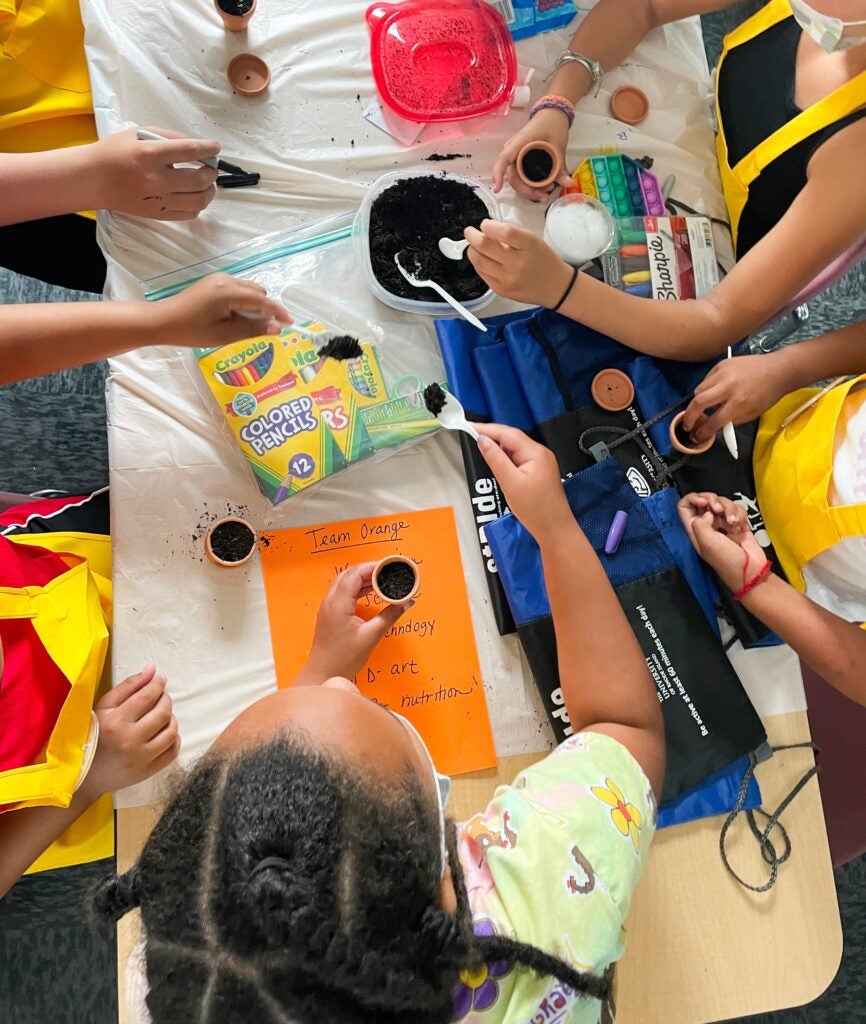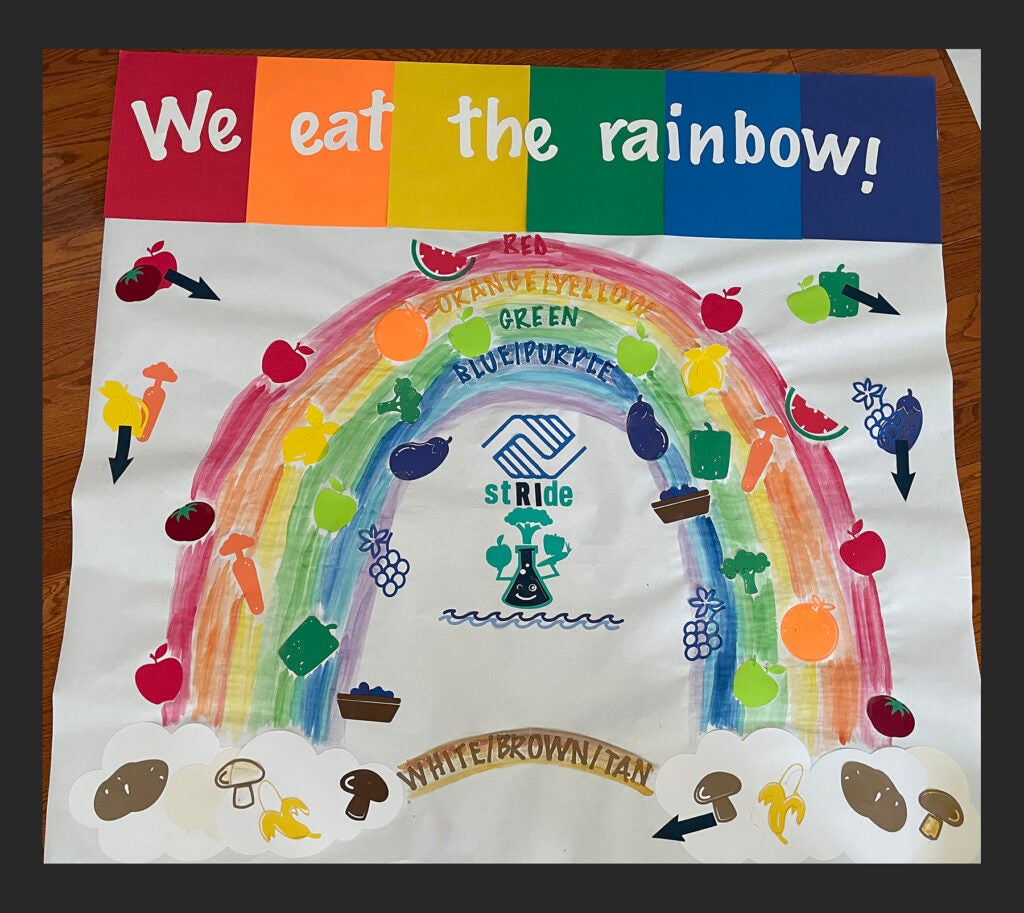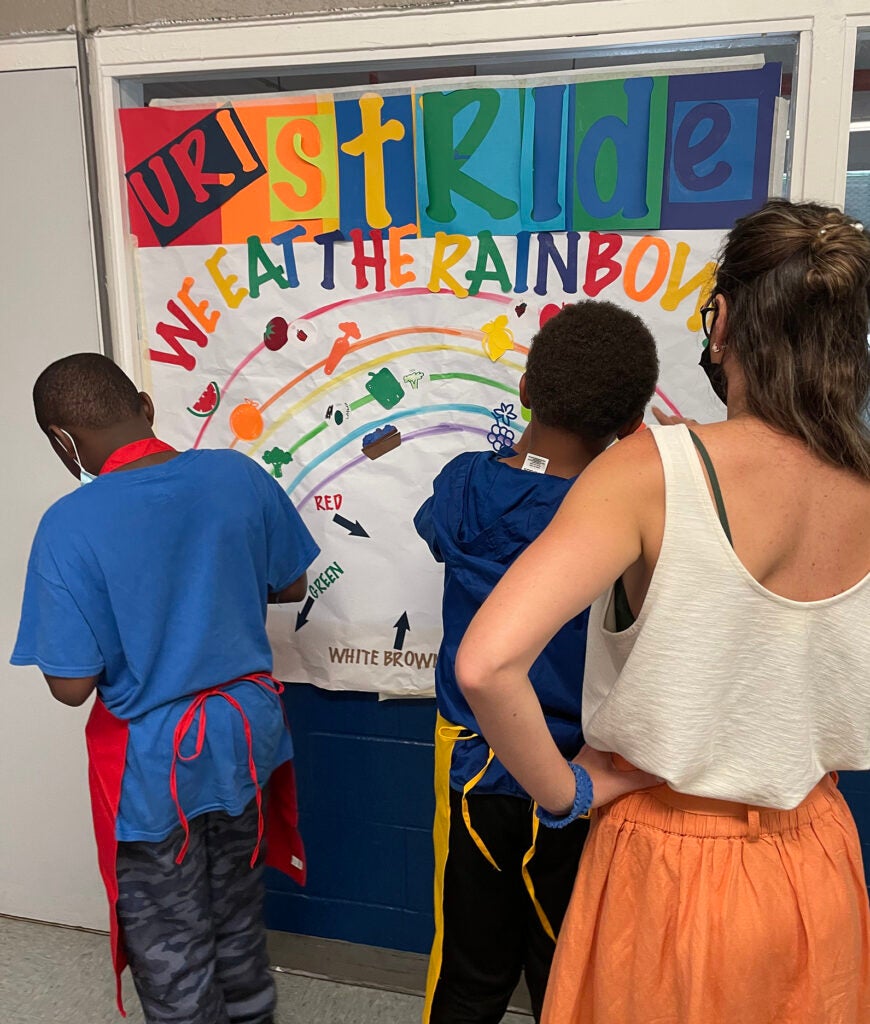Pilot program funded by 5-year, $639,000 USDA grant aims to address
disparities among at-risk youth, blending STEAM education and food literacy

KINGSTON, R.I. – July 15, 2021 – Despite having to wait because of the COVID-19 pandemic, elementary school students in Providence and Newport will soon be able to enhance their knowledge of science, technology, engineering, art and math through lessons centered on diet, nutrition and what happens in the kitchen. The new program, which was supposed to start with a summer camp in the summer of 2020, has gone through an extensive formative evaluation and is being piloted this month by the University of Rhode Island College of Health Sciences in cooperation with URI’s Cooperative Extension Network and community partners 4-H and the Boys & Girls Clubs of Providence and Newport County.
The program is funded through a competitive, five-year $639,000 grant from the USDA National Institute of Food and Agriculture as part of the Children, Youth, and Families at Risk program for sustainable community projects. The URI-led program will integrate STEAM (science, technology, engineering, art, and math) education and nutrition. In other words, innovative hands-on nutrition lessons have been developed to whet students’ appetites for science.

“Think chemistry and cooking; microbiology and food safety; environmental science and learning how your food grows and where it comes from,” says Sarah Amin, URI assistant professor of nutrition, who is also the project lead. “We’re very excited to be working with URI Cooperative Extension and our community partners to connect these different concepts in ways that are fun, innovative, sustainable and will also serve to empower the community.”
Known as Project stRIde (Science and Technology Reinforced by Innovative Dietary Education), the program aims to address disparities in the STEAM-academic achievement gap as well as dietary behaviors and food related skills among at-risk youth. State data indicates that Providence and Newport youth are below the state average in math and science test scores. Additionally, studies have shown the detrimental impact of summer vacation on academic progress.

As such, Project stRIde begins with a six-week summer camp series designed to help curb the summer learning slump and address educational disparities with an engaging, hands-on experience that will use STEAM to increase students’ food-related knowledge and skills in ways that can also be applied at home. The team worked closely with Rhode Island school teachers to develop a program that aligns with Common Core Math and Next Generation Science Standards and supports students academically, while also helping to excite them about STEAM careers.
“Especially in terms of the year students have just had with COVID-19 and remote learning, this camp comes at an opportune time,” said Jackie Potvin, a graduate teaching assistant in URI’s nutrition program working under Professor Amin, who worked on a formative evaluation of the curriculum. “Because we are working to tie in all aspects of STEAM and to make this accessible by engaging students with hands-on activities, we really have something for everyone. And to be able to reinforce those concepts students may have already spent some time on during the school year or perhaps only touched on briefly due to circumstances beyond their control is going to be so important.”
A central goal of the summer camp will be to increase enrollment and participation in 4-H clubs by youth during the school year. The camp will be conducted with URI Cooperative Extension specialists from 4-H and the Expanded Food and Nutrition Education Program, and the Boys & Girls Clubs of Providence and Newport County.
“A big part of what 4-H does is work to emphasize hands-on learning and engage students. Project stRIde is one more way to do that, by bringing lessons in STEAM directly to students in a way that involves them and gives them choices about their learning,” said Christina DiCenzo, 4-H program coordinator with URI Cooperative Extension. “Maybe nutrition or animal science or environmental science was not on their radar – but if we can bring the lesson to them, get them excited and let them know these opportunities exist and are an option, that is a huge part of getting them interested and making them feel as though they belong in that world. In terms of reaching underserved populations, this is a natural extension of some of the work that Cooperative Extension and 4-H are already doing and really speaks to our mission of strengthening individuals, families and communities.”
The prevalence of childhood obesity has become a critical public health issue facing states across the nation. In Rhode Island, approximately 30 percent of youth are considered overweight or obese – a rate that is generally higher in areas where poverty is more concentrated. The need to address these disparities is underscored in cities like Providence and Newport where 90 and 70 percent of students are eligible for free or reduced lunch, respectively.
“We’re excited to pair nutrition and science in a way that will make learning fun for kids and help to reinforce healthy habits,” said Kelsi Chappell, a registered dietitian and nutrition educator who worked on the summer camp curriculum. “By incorporating STEAM and demonstrating all the ways that it touches their lives in a real, tangible way, our hope is that we can increase students’ appetite for learning and open their eyes to new opportunity.”
One important silver lining the COVID delay helped to facilitate was that it allowed the team to film supplementary educational videos that coincide with the lessons. In addition to students who may not be able to make every day of camp, the videos will be made available to teachers and partners who may need a refresher on certain concepts or who are looking for ways to incorporate additional STEAM lessons into their curriculum, extending the life of the program as well as its sustainability.
Moving into the school year, Project stRIde will continue with a four-part, monthly family night series at the Boys & Girls Clubs sites for parents and children that will build on lessons from the summer program and aim to enhance family engagement in STEAM opportunities. The program will feature child-guided family activities incorporating summer family lesson content. It will also include cooking and recipe demonstrations and guest speakers as well as opportunities for students’ food and STEAM projects to be displayed.
“We are so thankful to our partners who have committed to be a part of this effort,” said Kate Balestracci, SNAP-Ed program manager through the College of Health Sciences, who is leading the program alongside Amin. “If we are to be successful in having the longer term community impact that we all want, partners will be an integral part of this program. Importantly, many have worked with parents and families in these communities before – so there is a relationship and a level of trust there that already exists. Beyond that, part of our goal is to set these partners up for success, to develop a long-lasting program that partners will be able to extend well past the life cycle of the grant.”
The program will culminate in a half-day Youth Food Summit that will bring students and their families to the University of Rhode Island’s Kingston campus and provide them with a platform to demonstrate their STEAM and food systems knowledge and skills. The program will coincide with the annual Food System Summit hosted by URI, which attracts food system stakeholders and community leaders from a variety of sectors across the state, giving students and their families opportunities to meet with these leaders, as well as faculty and staff, to learn about educational and career opportunities.
“This is an ambitious program – to be able to integrate and get youth excited about these different concepts is really important,” said Amin. “We have a great opportunity to work together to empower kids, parents and the community to begin to bridge some of the gaps we are seeing in a way that will endure. After so much program enhancement and development over the past year, I am really excited to start working with youth this summer.”
For more information on Project stRIde or to find out about summer camp, visit URI’s Community Nutrition Education website, or contact: projectstride@etal.uri.edu.
